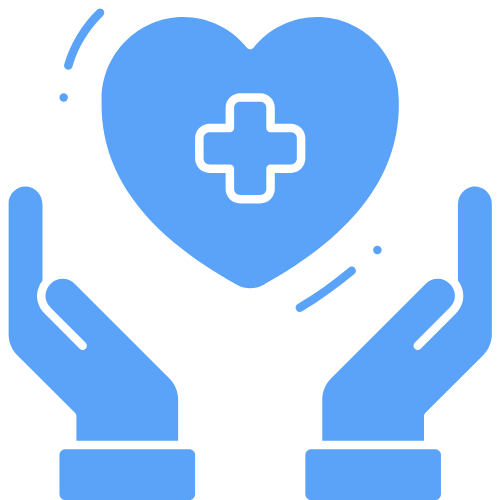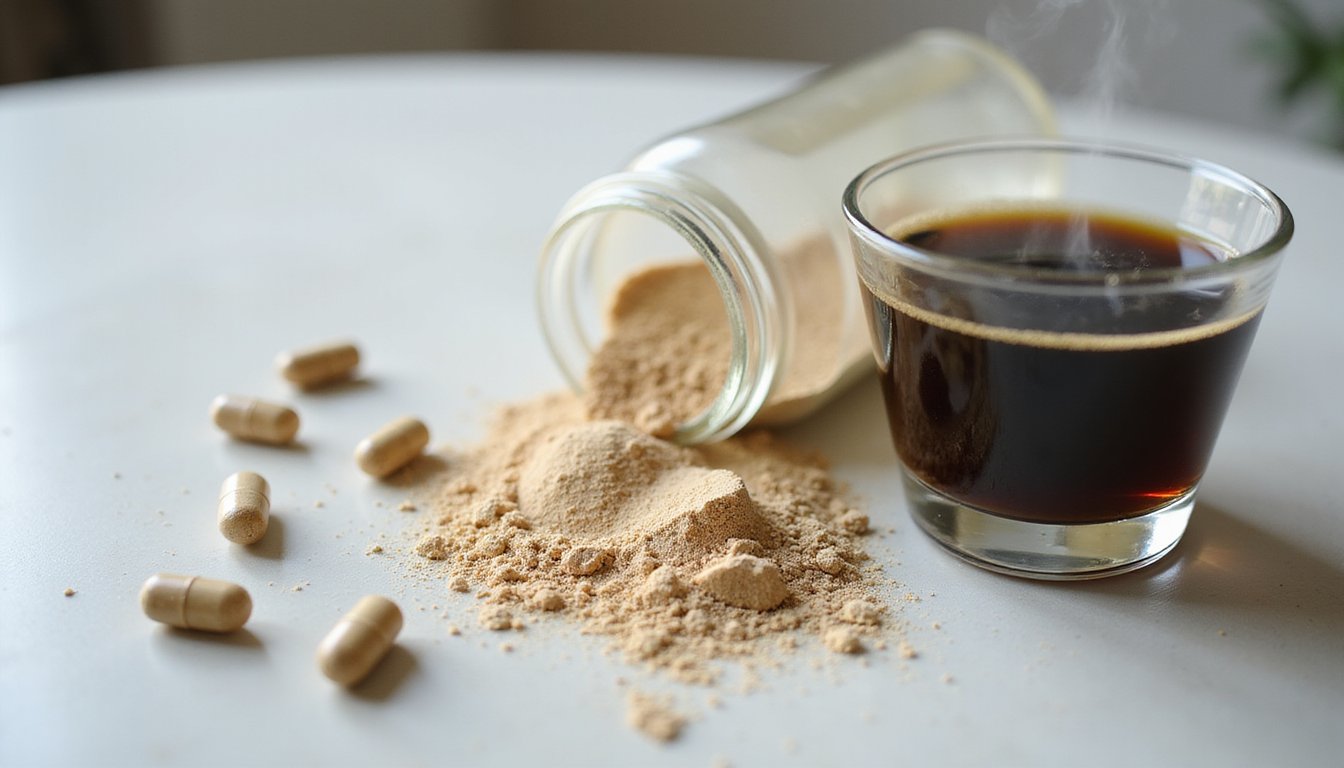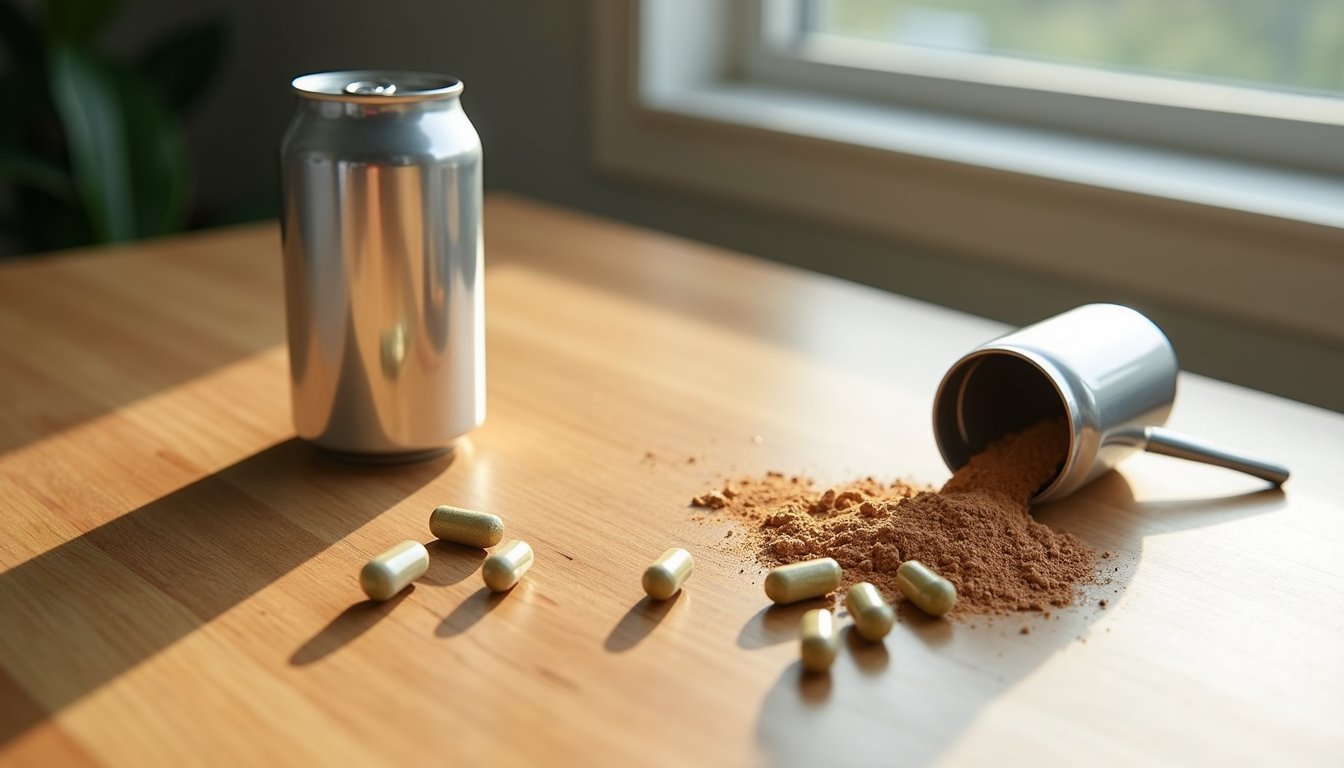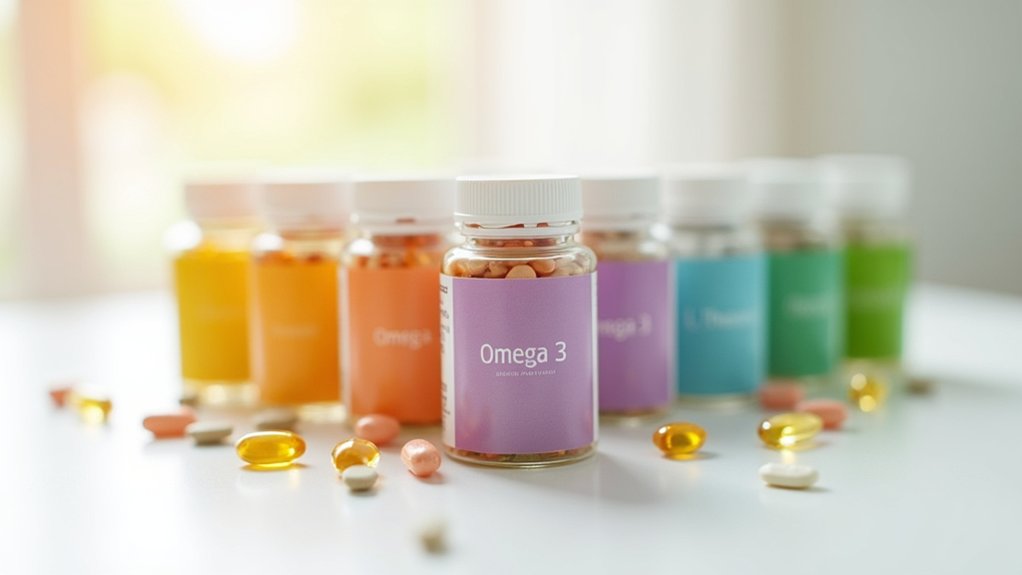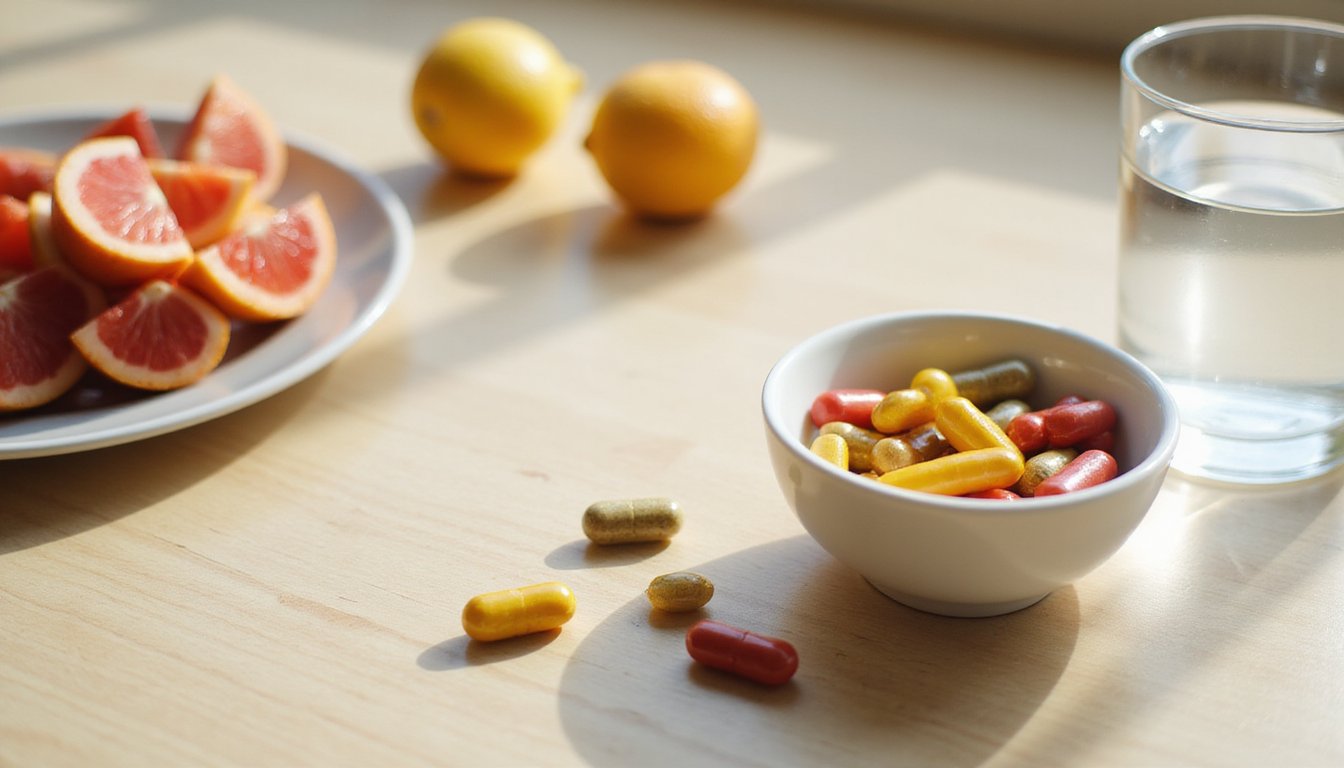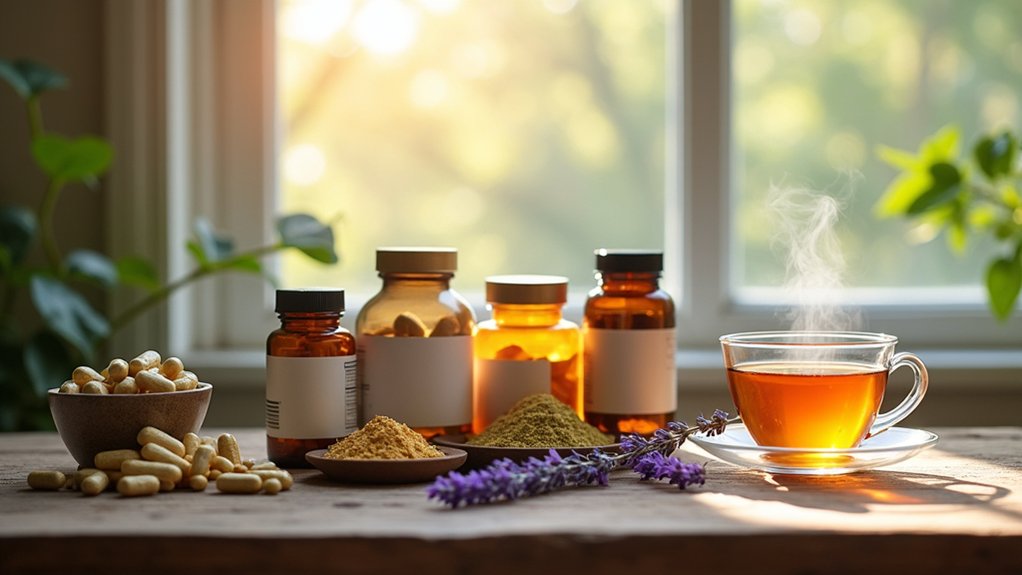Scientific research shows that SSRIs like fluoxetine and sertraline remain the most effective treatments for teen anxiety, with significant symptom improvement within 2-6 weeks. While prescription medications lead in evidence, certain supplements show promise: magnesium glycinate helps regulate brain function, omega-3s may reduce anxiety symptoms, and L-theanine can increase relaxation. B vitamins and specific probiotics offer additional support. Understanding the full range of options can help you make informed decisions about anxiety management.
The Scientific Evidence Behind SSRIs for Teen Anxiety
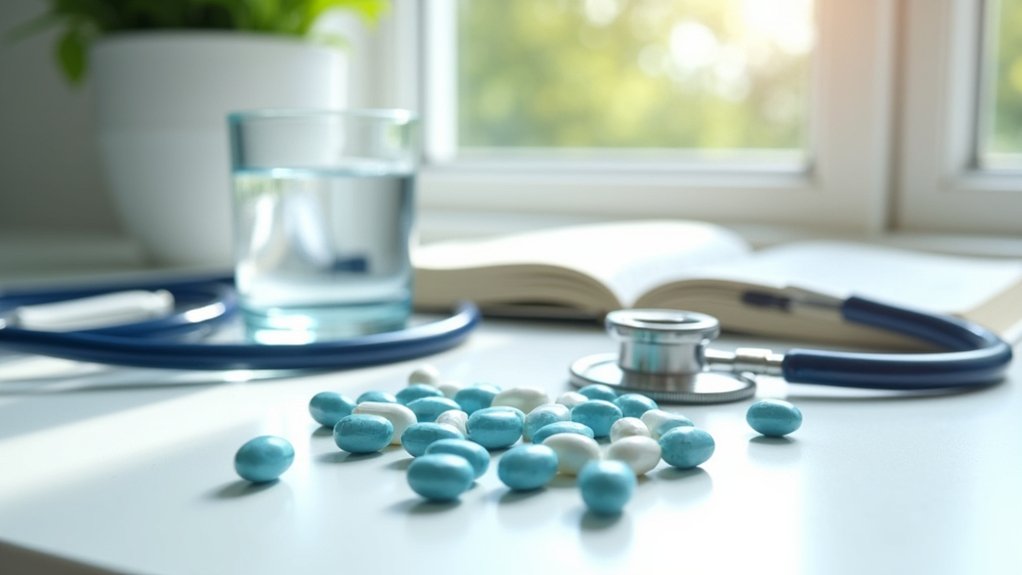
Three decades of research have established SSRIs as a cornerstone treatment for teen anxiety disorders. You’ll typically see significant symptom improvement within two weeks, with clinically meaningful results by week 6. SSRIs outperform other medications in both speed and magnitude of anxiety reduction, requiring just 3-6 patients to treat for one to benefit. Most studies used validated rating scales to measure anxiety symptom severity and track patient progress over time.
Fluoxetine and sertraline demonstrate the strongest evidence for teens, though potential barriers to adherence include initial motor hyperactivity and activation events. These side effects often emerge in the first four weeks but usually subside. Comprehensive treatment approaches should include supportive psychotherapy alongside medication. While monitoring is essential, SSRIs’ positive impact on academic performance often outweighs temporary discomfort. The medications work best for generalized anxiety, social anxiety, and separation anxiety disorders, showing more robust benefits compared to their use in depression. Experts typically recommend continuing treatment for one full year after achieving symptom stability.
Omega-3 Supplements: Separating Fact From Fiction
While omega-3 supplements have gained popularity for teen anxiety, the scientific evidence supporting their use remains mixed and limited. The strongest research shows modest benefits primarily in clinical populations with diagnosed conditions rather than healthy teens, with some studies finding anxiety reduction at doses ranging from 1000-2496 mg daily. Only 5 randomized trials evaluated anxiety symptoms in young people aged 14-24. You’ll want to look past marketing claims and focus on what clinical trials actually reveal: there’s still no clear consensus on ideal, suitable, or appropriate dosing, EPA:DHA ratios, or treatment duration for anxiety symptoms in adolescents. Most commercial supplements contain significantly less EPA than the 600-800 mg typically found in over-the-counter preparations. Studies show that omega-3 deficiency can lead to changes in the brain’s dopamine and serotonin systems, which play crucial roles in anxiety regulation.
Clinical Evidence Still Limited
Despite growing interest in omega-3 supplements for teen anxiety, the clinical evidence remains mixed and inconclusive. While some studies show promise, with three out of five randomized controlled trials reporting reduced anxiety symptoms, many findings are inconsistent across different populations and treatment protocols. Studies suggest anti-inflammatory actions may contribute to anxiety relief.
Research reveals a modest anxiolytic effect in clinical populations, but there’s significant variation in study quality and results. One significant study found that medical students receiving 2.5 grams daily of omega-3 supplementation experienced notable anxiety reduction. You’ll find high heterogeneity in supplementation approaches, with doses ranging from 1,000 to 2,496 mg daily and treatment periods varying from 8 to 12 weeks. Most studies lack participants with diagnosed anxiety disorders, making it difficult to draw firm conclusions about clinical effectiveness. While some trials show up to 20% reduction in anxiety symptoms alongside decreased inflammatory markers, we need larger, better-designed studies to confirm these effects and establish preferred dosing guidelines.
Safety Over Popular Claims
In evaluating omega-3 supplements for teen anxiety, safety considerations must take precedence over marketing claims. While marketing often overstates benefits, research shows omega-3s are generally safe at recommended doses, with minimal side effects like mild gastrointestinal discomfort. Research indicates that adverse events remain low with omega-3 supplementation, providing reassurance about its general safety profile. The optimal ratio of EPA to DHA is 2:1 for treating mood disorders based on clinical evidence. Studies demonstrate that clinical anxiety patients show greater improvement compared to those without diagnosed conditions. Current evidence supports dosage considerations of up to 2g/day, though efficacy thresholds specifically for teens remain unclear. You’ll want to focus on safety rather than popular claims, as research shows lower doses haven’t demonstrated significant anxiety reduction. While omega-3s show promise, more research is needed to confirm their effectiveness in adolescent populations.
| Marketing Claims | Scientific Reality |
|---|---|
| Miracle cure for anxiety | Modest benefits at best |
| Any dose works | 2g/day threshold needed |
| Safe at all doses | Limited teen safety data |
| Works for everyone | Results vary by individual |
| Quick results | Effects take time to develop |
Magnesium Glycinate’s Role in Anxiety Management
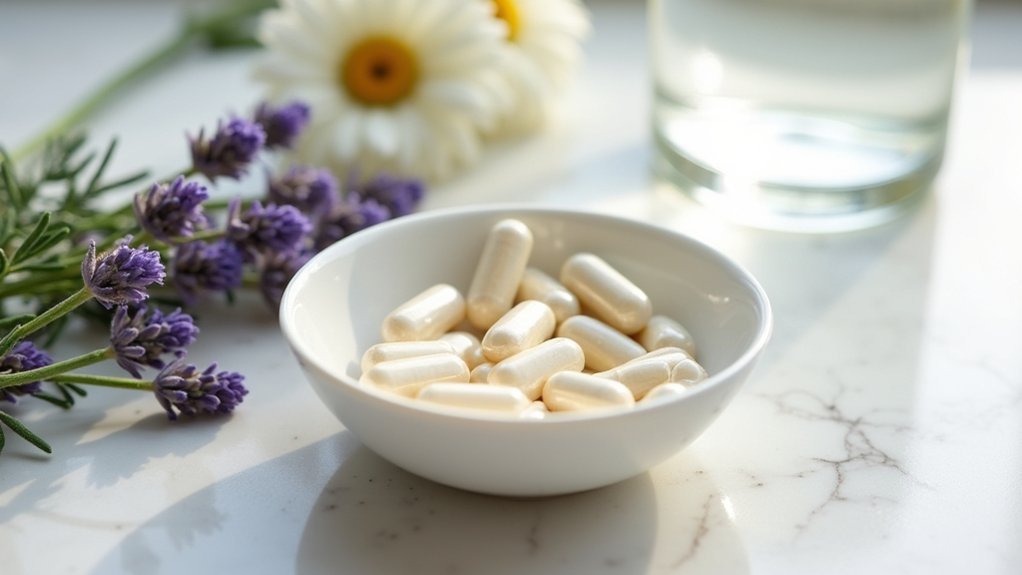
Your body absorbs magnesium glycinate more effectively than other forms of magnesium, with studies showing superior bioavailability and fewer digestive side effects. This highly absorbable form supports anxiety reduction through multiple neural pathways, including enhanced GABA receptor sensitivity and balanced glutamate activity in key brain regions. Research shows that magnesium glycinate achieves an impressive 80-90% absorption rate. While research supports magnesium glycinate’s safety profile, teens should consult healthcare providers for appropriate dosing, as specific long-term safety data for adolescents remains limited. Clinical studies have demonstrated that this supplement plays a vital role in neurological homeostasis, helping maintain balanced brain function during periods of stress. Given that 70% of Americans are deficient in magnesium, supplementation may be particularly beneficial for teens experiencing anxiety symptoms.
Absorption and Neural Benefits
When managing anxiety symptoms in teens, magnesium glycinate stands out as the most bioavailable form of oral magnesium supplementation, offering superior absorption and neural benefits. You’ll find enhanced neurotransmitter modulation through its ability to regulate GABA and glutamate activity, while optimized nutrient absorption guarantees consistent delivery to neural tissues. The combination of magnesium with two glycine molecules creates an exceptionally stable compound that maximizes therapeutic benefits. Studies indicate that higher doses above 300mg demonstrate better efficacy for anxiety management in clinical settings.
| Benefit | Clinical Impact |
|---|---|
| Absorption | Up to 50% better bioavailability than other forms |
| Neural Function | Buffers excitatory signals and enhances GABA |
| Sleep Quality | Improves rest through glycine’s calming effects |
The glycine component works synergistically with magnesium to reduce CNS hyperactivity, making it particularly effective for teens who need gentle yet reliable anxiety support. You’ll notice minimal digestive discomfort compared to other forms, ensuring consistent daily use for maintaining steady neurological function.
Safety During Teen Years
Most teens can safely incorporate magnesium glycinate supplementation into their anxiety management routine, with clinical evidence supporting its gentle profile and minimal side effects. This form offers superior digestive tolerability compared to other magnesium supplements, with standard doses of 100-350mg daily showing excellent safety records. Research confirms minimal nutrient interactions, making it compatible with common psychiatric medications.
- Demonstrates the highest safety profile among magnesium supplements for adolescents
- Shows minimal risk of gastrointestinal upset, even during extended use
- Supports healthy neurodevelopment without interfering with other medications
- Particularly beneficial for teens with poor dietary intake or high stress levels
- Can be used long-term without significant adverse effects when taken as directed
For ideal results, start with lower doses and gradually increase while monitoring your body’s response. Always consult healthcare providers before starting any supplement regimen.
B Vitamins and Their Impact on Teen Mental Health
B vitamins play a pivotal role in teen mental health by supporting the production and regulation of essential mood-stabilizing neurotransmitters like serotonin, dopamine, and norepinephrine. Research shows that B6, B9, and B12 are particularly imperative for DNA methylation regulation and homocysteine elimination, processes that directly impact brain health and cognitive function.
| B Vitamin | Mental Health Benefits | Food Sources |
|---|---|---|
| B6 | Converts tryptophan to serotonin | Lean meats, chickpeas |
| B9 (Folate) | Reduces depression risk | Leafy greens, legumes |
| B12 | Improves cognitive function | Fish, eggs, dairy |
Studies indicate that B vitamin supplementation can help reduce stress and support mood, especially in teens with deficiencies. While not a standalone treatment for anxiety, maintaining adequate B vitamin levels through diet or supplementation may enhance your teen’s emotional resilience and stress management capabilities.
L-Theanine: A Natural Option for Anxiety Relief

Along with B vitamins, another promising natural compound for teen anxiety is L-theanine, an amino acid analogue found primarily in green tea leaves. Research shows that after dose absorption, L-theanine crosses the blood-brain barrier to increase calming alpha brain waves and reduce stress hormones like cortisol. Clinical studies demonstrate its synergistic effects on both psychological and physical symptoms of anxiety.
- Reduces anxiety scores on standardized tests without causing drowsiness
- Increases relaxation-linked alpha brainwave activity within 3 hours
- Decreases stress hormone levels within 1 hour of taking 200mg
- Shows excellent safety profile with minimal side effects
- Works by naturally boosting calming neurotransmitters like GABA and serotonin
While more research is needed specifically in teens, L-theanine’s demonstrated effects and safety make it a promising natural option for anxiety relief.
Emerging Research on Ashwagandha and Probiotics
Recent scientific investigations have revealed promising evidence for two emerging anxiety supplements: ashwagandha and probiotics.
While research on ashwagandha shows potential benefits for stress reduction and cognitive performance enhancement, you’ll want to note that evidence for teens remains limited. The herb’s adaptogenic properties can lower cortisol levels and improve sleep quality, but teen dosing should start conservatively at 200mg daily under medical supervision due to possible side effects.
Probiotics represent another promising avenue through the gut-brain axis. Specific strains of Lactobacillus and Bifidobacterium demonstrate stress-induced inflammation modulation and may help reduce anxiety markers in adolescents. However, you should understand that research is still emerging, and results vary by strain. Both supplements warrant careful consideration and professional guidance before incorporation into any teen anxiety management plan.
Frequently Asked Questions
How Long Should Teens Wait Before Switching to a Different Supplement?
You should wait 4-8 weeks before making supplement replacement timing changes, unless you experience significant side effects. Clinical evidence suggests this timeframe allows proper evaluation of effectiveness. For gradual dose adjustments, maintain consistent use for at least 4 weeks to assess outcomes. Don’t switch supplements more quickly than this period, as it increases risk of adverse reactions and makes it harder to determine which supplements are actually helping.
Can Anxiety Supplements Interfere With Medications for ADHD or Depression?
Yes, anxiety supplements can markedly interfere with your ADHD or depression medications through various medication interactions. You’ll need to be especially careful with supplements like St. John’s wort, which can reduce antidepressant effectiveness, and 5-HTP, which carries serious side effect risks when combined with SSRIs. Before starting any supplement, you should consult your healthcare provider for monitoring, as some combinations can affect heart rate, blood pressure, or cause dangerous serotonin syndrome.
What Time of Day Is Best to Take Anxiety Supplements?
You’ll want to take stimulating supplements like ashwagandha during your morning routines to better monitor effects and avoid sleep disruption. For calming supplements that may cause drowsiness, like magnesium or certain herbs, incorporate them into your evening wind down. The key is maintaining consistent timing daily for ideal therapeutic levels. Take supplements with food when possible to minimize stomach upset, and always check with your doctor about specific timing recommendations for your situation.
Are There Any Supplements That Help Specifically With Test Anxiety?
Yes, L-theanine (200mg) has strong scientific evidence for reducing test anxiety specifically. You’ll find it’s particularly effective for acute, task-related stress during exams. Natural stress reducing herbs like ashwagandha show promise, while calming amino acid supplements like L-lysine combined with L-arginine can lower test-specific cortisol responses. If you’re looking for the most research-backed option, L-theanine is your best bet, especially when taken 30-60 minutes before an exam.
Should Supplements Be Taken With Food or on an Empty Stomach?
Proper timing of your supplements depends on their specific properties. Fat-soluble supplements (like vitamins A, D, E, K) need food with dietary fat for ideal absorption efficiency, while water-soluble vitamins work better on an empty stomach. You’ll want to take minerals like calcium and magnesium with food to prevent stomach upset. Always check your supplement’s label, as some formulations have specific timing requirements to maximize their effectiveness.
